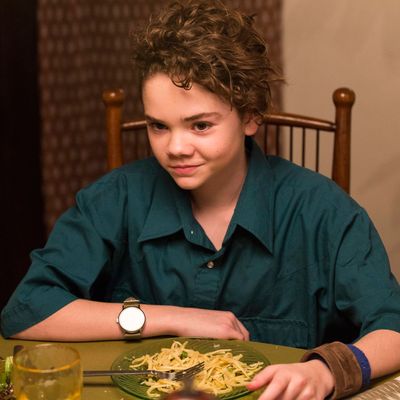
Every time you think Better Things is going to make an obvious right turn, it surprises you by veering left.
In this week’s episode, “Brown,” Sam invites one of her directors, played by Lenny Kravitz, to have dinner with her family. Despite potential roadblocks tossed in the way of this budding relationship — Frankie telling a ballet diarrhea story in the middle of dinner; Phil casually dropping the N-word multiple times into a story about pantyhose — Sam and Mel warm to each other. Watch Sam’s face while Mel tells Max how lucky she is to have a mother who is an artist. You can see her (almost, maybe) falling in love with him.
On any other show, these two totally would hook up at the end of the episode. Instead, they do the more mature thing: They acknowledge they like each other, but with Mel leaving town and still going through a divorce, and Sam hesitant to start something that can’t be continued, they refrain from acting on their feelings.
Both that moment and the entire episode are about knowing what the Rolling Stones said is true: You can’t always get what you want. Sometimes you have to settle, in ways that are moderately significant — like directing a TV show in which David Duchovny suddenly insists his character needs to wear prayer beads — and in ways that are life-altering, like staying with a husband who does nothing but get high all day, as Sam’s friend Sunny has. (By the way, isn’t it nice to see Alysia Reiner playing a warm, funny, vulnerable woman, after her cutthroat work as Figueroa on Orange Is the New Black?)
“I’m blessed to be working,” Mel tells Sam, even though he’s not doing exactly what he wants to do. “That’s right,” she replies, even though she isn’t doing exactly what she wants, either.
This is what adulthood looks and sounds like.
As has been the case in the previous episodes of Better Things, the creative decisions made in “Brown,” written by Louis C.K. and directed by Nisha Ganatra, are precise and assured. Casting Kravitz as Mel — the hot, sensitive, geek-hipster filmmaker boyfriend of your dreams — provides a bit of fantasy wish fulfillment for not only Sunny, but also those of us watching. (Sam might actually get to hit that!) The fact that Kravitz is the son of late TV producer Sy Kravitz and Jeffersons star Roxie Roker makes it extra appropriate that Mel has such an appreciation for Sam’s work from her sitcom days.
The unspoken things carry weight as well. As subtly established in last week’s episode when Frankie counted the number of times she repeated Mrs. Donner’s name, Sam’s middle child clearly has some form of obsessive-compulsive disorder, which reveals itself again when she insists on shaking Mel’s hand an even number of times. It’s interesting that this behavior only occurs when she’s attempting to be polite and formal. It’s also interesting that, in keeping with this show’s commitment to authenticity and underplaying moments, Sam doesn’t call attention to the behavior at all.
And then there’s the business with Sam’s mother, Phil. But first, a quick aside: You’ve probably noticed that every female character on this show has a gender-ambiguous name: Sam, Max, Frankie, Duke, and Phil, which is technically short for Phyllis. In a recent appearance on Fresh Air, Adlon explained that most of the characters were named after people in her family, with the exception of Duke, whose name was suggested by the casting director. That’s another great detail that I love, though I also love the idea that these girls and women have somewhat masculine-sounding names because they can’t be reduced to gender stereotypes.
Okay, back to Phil. When Mel first meets her, he notices that she gives him a surprised, odd look. Privately, he tells Sam that she probably should have given her mother a heads-up that he’s black. “I’m not calling your mother racist,” he explains. “I’m calling her over 70.” Sam insists that he’s wrong, that her mother is open-minded and even supported integration. If he thinks she’s in any way shocked by the color of his skin, Sam reasons, that must be his own baggage.
On another show, Sam’s mother would probably be super-nice to Mel and say something extremely progressive that would make him go, “You know, I was wrong. Not all older white people have racist tendencies that have been ingrained in them since childhood.” And then, since Lenny Kravitz is the guest star, “Let Love Rule” would play softly on the soundtrack.
Needless to say, this is not that show. Which is why Phil launches into a non-sequitur story about how Harrods used to sell pantyhose in three colors: nude, white and n—– brown. (There is no way a stocking color was ever called that, is there?) She then proceeds to recall how she tried to order a n—– brown pair from a black woman working behind the counter, who was shocked — much like everyone at Sam’s dinner table — to hear her say the N-word so many times. “I said to her, ‘I did you the honor of not noticing your color,’” Phil says. “’Would you do me the honor of getting my item for me?’”
Phil probably doesn’t know the word woke, but nevertheless, she seems to think this story demonstrates how woke she is. In reality, it is maybe the most white-privilege thing ever uttered in the history of clueless white people. Sam is mortified, while Mel just smiles the smile of a black man proven right. It’s an uncomfortable moment, and a funny one, and a real one. And it’s yet another example of what makes Better Things so damn great.


